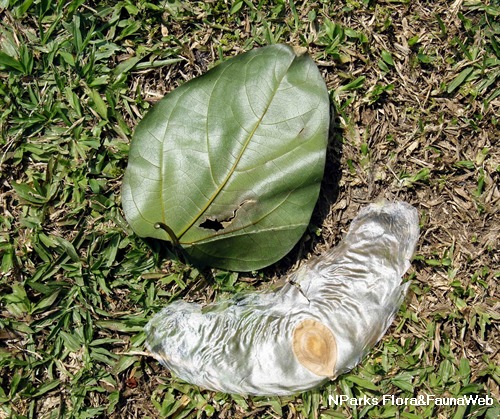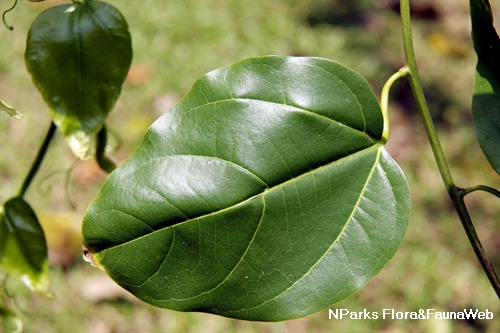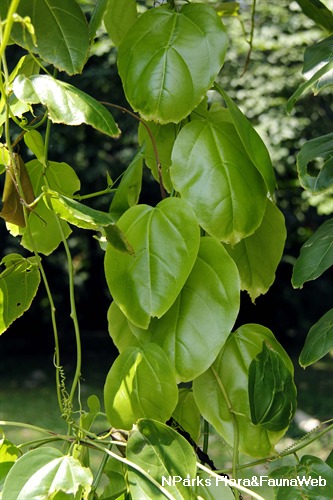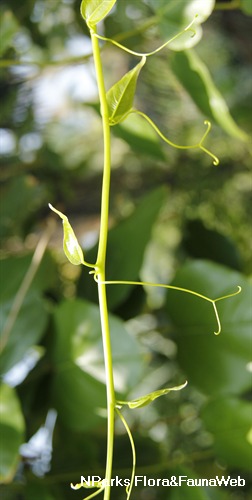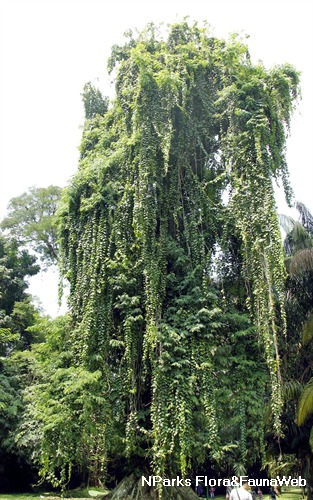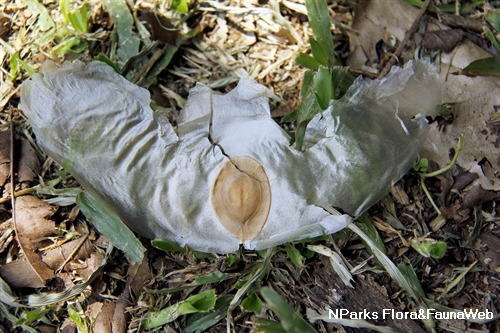
Name
Classifications and Characteristics
| Plant Growth Form | Climber |
|---|---|
| Lifespan (in Singapore) | Perennial |
Biogeography
| Native Distribution | Southern Thailand, Peninsular Malaysia, Borneo, Indonesia (Sumatra, West Java, Sulawesi, Moluccas (Aru Islands), Philippines, New Guinea (Papua New Guinea including Bismark Archipelago, West Papua) |
|---|---|
| Native Habitat | Terrestrial |
| Preferred Climate Zone | Tropical |
Description and Ethnobotany
| Growth Form | Large climber 30-50m long, base of the stem of mature specimens to 15cm thick. |
|---|---|
| Foliage | Mature leaves mid green, unlobed, ovate to elliptic, 8-16cm long by 3-13cm wide. Juvenile plants with a completely different form and leaf shape. Young plants creeping on forest floor with thin, thread like stem; leaves oblong, to 1cm long, spaced far apart. Juvenile plants adhering to tree trunks for support via adhesive discs on the tip of the bifid tendrils, leaves becoming hastate (spear shaped) in shape (also with auricles or 'ear like' lobes in younger leaves). Mature leaves are produced when the plant climbs up to 5m or more in height. |
| Flowers | Male and female inflorescence borne on separate shoots. Male inflorescence many flowered, 5-15cm long, arising from short leaf shoots, 1-2 times branched. Male flowers greenish-cream, 0.7-1cm in length. Female inflorescence usually unbranched, with 5(occasionally 10) flowers. Female flowers on long pedicels (flower stalks) to 20cm long; petals to 09=.9cm long. |
| Fruit | Mature fruit a brown wood capsule, 20-30cm across. Inside of the fruit with a soft spongy layer, packed with many seeds. Seeds pale brown 2.5cm long by 2-2.3cm wide, set in a large, membranous wing 10-12cm across. |
| Habitat | In forests to 800m, on rich soils and clayey soils along rivers. |
Landscaping Features
| Desirable Plant Features | Ornamental Seeds |
|---|---|
| Landscape Uses | Parks & Gardens |
| Usage Hazard - Cons | Large Heavy Fruits |
Fauna, Pollination and Dispersal
| Pollination Method(s) | Biotic (Fauna) |
|---|---|
| Seed or Spore Dispersal | Abiotic |
Plant Care and Propagation
| Light Preference | Full Sun, Semi-Shade |
|---|---|
| Water Preference | Lots of Water, Moderate Water |
| Plant Growth Rate | Fast |
| Rootzone Tolerance | Moist Soils, Well-Drained Soils, Fertile Loamy Soils |
| Pest(s) | Chewing Insects, Sucking Insects |
| Propagation Method | Seed |
Foliar
| Foliage Retention | Evergreen |
|---|---|
| Mature Foliage Colour(s) | Green, Green - Light Green |
Floral (Angiosperm)
| Flower Colour(s) | Cream / Off-White, Green - Light Green |
|---|---|
| Flower Grouping | Cluster / Inflorescence |
Fruit, Seed and Spore
| Mature Fruit Colour(s) | Brown |
|---|---|
| Mature Seed Colour(s) | Brown |
Image Repository
Others
| Master ID | 31974 |
|---|---|
| Species ID | 6376 |
| Flora Disclaimer | The information in this website has been compiled from reliable sources, such as reference works on medicinal plants. It is not a substitute for medical advice or treatment and NParks does not purport to provide any medical advice. Readers should always consult his/her physician before using or consuming a plant for medicinal purposes. |

